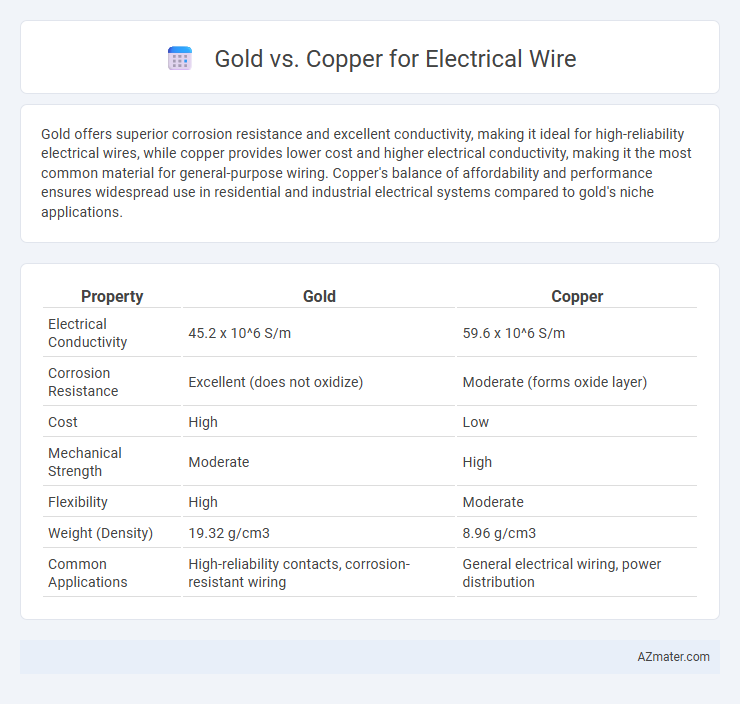Gold offers superior corrosion resistance and excellent conductivity, making it ideal for high-reliability electrical wires, while copper provides lower cost and higher electrical conductivity, making it the most common material for general-purpose wiring. Copper's balance of affordability and performance ensures widespread use in residential and industrial electrical systems compared to gold's niche applications.
Table of Comparison
| Property | Gold | Copper |
|---|---|---|
| Electrical Conductivity | 45.2 x 10^6 S/m | 59.6 x 10^6 S/m |
| Corrosion Resistance | Excellent (does not oxidize) | Moderate (forms oxide layer) |
| Cost | High | Low |
| Mechanical Strength | Moderate | High |
| Flexibility | High | Moderate |
| Weight (Density) | 19.32 g/cm3 | 8.96 g/cm3 |
| Common Applications | High-reliability contacts, corrosion-resistant wiring | General electrical wiring, power distribution |
Introduction to Electrical Wiring Materials
Gold and copper are two prominent materials used in electrical wiring, valued for their excellent conductivity and durability. Copper, being more affordable and widely available, offers high electrical conductivity and corrosion resistance, making it the standard choice for most residential and industrial wiring applications. Gold, despite its higher cost, provides superior resistance to oxidation and excellent conductivity, often used in specialized electronic components and high-reliability connectors where long-term durability is critical.
Conductivity Comparison: Gold vs Copper
Copper exhibits superior electrical conductivity, approximately 5.96 x 10^7 S/m, making it the preferred choice for most electrical wiring applications. Gold's conductivity is lower, around 4.10 x 10^7 S/m, but it offers exceptional resistance to corrosion and tarnish. This durability ensures reliable long-term performance in environments where oxidation would degrade copper conductivity.
Corrosion Resistance and Longevity
Gold exhibits superior corrosion resistance compared to copper, making it ideal for environments prone to oxidation or chemical exposure. While copper offers excellent electrical conductivity, it is more susceptible to tarnishing and corrosion over time, which can impact connection reliability. Gold's longevity and stable conductivity ensure consistent performance in critical applications despite its higher cost.
Cost Analysis: Gold vs Copper Wire
Copper wire offers significantly lower material costs compared to gold wire, making it the more economical choice for most electrical wiring applications. Gold wire, while providing superior corrosion resistance and conductivity, incurs a much higher price per gram and total installation expense. For large-scale projects, copper's affordability and adequate electrical performance outweigh the premium cost of gold wire.
Mechanical Strength and Flexibility
Gold offers superior corrosion resistance and excellent flexibility, making it ideal for applications where repeated bending occurs; however, it has lower mechanical strength compared to copper. Copper provides high tensile strength and durability, better suited for structural stability in wiring but is less flexible and more prone to fatigue under continuous bending. The choice between gold and copper for electrical wire hinges on balancing mechanical strength with flexibility requirements specific to the application.
Thermal Performance in Electrical Applications
Gold offers superior thermal conductivity compared to copper, with values around 318 W/m*K versus copper's 400 W/m*K, making copper generally more efficient for heat dissipation in electrical wiring. Copper's lower electrical resistance minimizes heat generation during current flow, enhancing overall thermal management in electrical applications. Gold's inertness and resistance to oxidation provide stable thermal and electrical performance in environments exposed to corrosive elements, though copper remains the preferred choice where thermal performance and cost efficiency are critical.
Common Uses in Industry and Electronics
Gold excels in corrosion resistance and conductivity, making it ideal for high-reliability applications such as semiconductor connectors, circuit boards, and aerospace electronics. Copper's superior electrical conductivity and cost-effectiveness dominate in power transmission, building wiring, and general-purpose electrical cables. Industries prioritize gold for signal integrity in sensitive electronics, while copper remains the standard for robust power delivery and grounding systems.
Weight and Density Considerations
Gold's density of 19.32 g/cm3 makes it significantly heavier than copper, which has a density of 8.96 g/cm3, affecting the overall weight of electrical wiring systems. The higher weight of gold requires stronger support structures and increases installation complexity in extensive wiring projects. Copper's lower density contributes to lighter cables, making it more practical and cost-effective for most electrical applications where weight is a critical factor.
Environmental Impact and Sustainability
Gold and copper differ significantly in environmental impact and sustainability for electrical wiring, with copper being more abundant and easier to recycle, reducing its ecological footprint. Mining gold involves higher energy consumption and toxic chemical usage, leading to greater environmental degradation compared to copper extraction. Copper's high recyclability and lower environmental costs make it a more sustainable choice for electrical wire applications.
Choosing the Right Material for Your Needs
Gold offers superior corrosion resistance and excellent conductivity, making it ideal for high-reliability, low-current applications such as connectors and sensitive electronic components. Copper, with its high electrical conductivity, affordability, and ease of installation, is the preferred choice for general electrical wiring, power distribution, and household circuits. Selecting between gold and copper depends on balancing factors like budget, electrical performance requirements, and environmental conditions.

Infographic: Gold vs Copper for Electrical Wire
 azmater.com
azmater.com